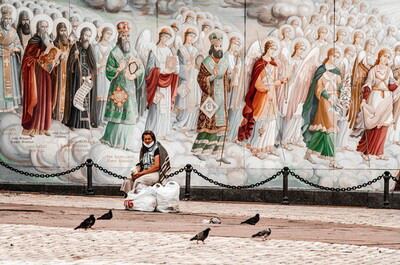|
A young adult recently spilled his feelings about the church over coffee and a boxed lunch:
“Church can feel irrelevant, or even antagonistic, to young adults and their explorations. We want spaces where we can ask questions, make meaning, and be in relationships with others. And it doesn’t matter if we meet those needs outside the church.” I’ve spent the last year-and-a-half talking with churches and young adults, or those individuals aged 18 to 25 (or even 29), throughout metropolitan Atlanta in an effort to bridge the gap between Christian congregations and young people. That young adult’s words align with the sentiments of many young adults I talk with regularly—they long for a place to discern their identity, find belonging and community, and live meaningful lives. In my experience, young adults do not feel allegiance to institutions, denominations, or religious dogma. Instead, they pick and choose beliefs and practices to meet the felt needs of meaning-making and belonging. They bounce between churches and brunch; self-help books are stacked next to Scriptures; CrossFit cohabits nicely with a small group. Can’t the church be a gathering around the dinner table with friends? Can spirituality mean connecting deeply with a partner? Why do we need a building to mediate God’s presence? If the church has no “rizz,” or charisma, young adults will go somewhere else. A cacophony of voices offers hot takes on young adults with new church growth strategies. Here's yet another take: Young adults aren’t decrying God or spirituality; they long for safe spaces to ask questions regarding their beliefs. And the church can be a place that helps young adults harmonize their spiritual leanings and sacred experiences with a richer story and tradition. But the focus can’t be on filling seats or pews. Instead, the church must be willing to engage genuinely with young adults in ways that are open to their evolving spiritual journeys. READ MORE https://firebrandmag.com/articles/young-adult-ministry-in-the-age-of-authenticity
0 Comments
Many of my friends are dead. I don’t mean that I lost them over the span of my life—we were never alive at the same time. Many of them lived on different continents before flight technology was available, while others couldn’t speak a lick of English. But none of this matters; we share a deep bond. I’m not sure it’s even accurate to call them dead. Their blood courses in ink throughout pages encased between two covers. Every time the book is opened, a heart begins to beat and a soul is animated back to life…..
read more at fathom. https://www.fathommag.com/stories/the-communion-of-all-the-saints A student sat in front of me and shared that she was unable to believe in anything that she could not immediately perceive. “It’s obvious that your cup exists, but God is questionable. And I’m not sure that I can say that I’ve had an experience of God. Most experiences of God have some kind of rationale.” In other words, we live in a world where naturalistic explanations abound and overshadow belief in the transcendent. Read more here: https://firebrandmag.com/articles/responsible-experience-following-the-spirit The heat broke down the sugar molecules of the onions and they sat in a pool of hot oil. The air was filled with a sweet aroma. Science makes life smell so good. My memories of the kitchen are idyllic—Norman Rockwell—mundane and beautiful. Tyson chicken strips and homemade marinara sauce. This is the place where mom and dad lingered over the last drop of coffee from the pot in the morning. We held hands and said, “God is great. God is good” and put dishes into the washer. We gathered at the counter for late night discussions, always about the high school teacher who should’ve been fired. Do you remember that time he let that girl bring her horse to school?
None of this can possibly be completely accurate. Memories are deceptive, after all. Our kitchen was also a broken place; there was a crack down the center of the table. Or, it was a square instead of a circle, with sharp edges. It was too small and short-sighted. It was a sphere thatexacerbated our culture’s hierarchies and power structures—a place where dads cook with fire, but not flour. Moms, meanwhile, are supposed to do everything else and also clean, while settling for a chicken wing and the occasional compliment, “this tastes better than last time.” Resentment and exhaustion were palpable in the kitchen as we all consumed the dead so that we could live another day read more here https://agapereview.com/2021/12/20/politicsofthetable/ |




